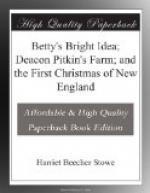“But there’s one that ain’t softly!” Biah suddenly continued, as the vision of a black-haired, bright-eyed girl suddenly stepped forth from the doorway, and stood shading her face with her hands, looking towards the sunset. The evening light lit up a jaunty spray of golden rod that she had wreathed in her wavy hair, and gave a glow to the rounded outlines of her handsome form. “There’s a sparkler for you! And no saint, neither!” was Biah’s comment. “That crittur has got more prances and capers in her than any three-year-old filly I knows on. He’ll be cunning that ever gets a bridle on her.”
“Some says she’s going to hev Jim Pitkin, and some says it’s Bill,” said Abner, delighted to be able to add his mite of gossip to the stream while it was flowing.
“She’s sweet on Jim while he’s round, and she’s sweet on Bill when Jim’s up to college, and between um she gets took round to everything that going. She gives one a word over one shoulder, and one over t’other, and if the Lord above knows what’s in that gal’s mind or what she’s up to, he knows more than I do, or she either, else I lose my bet.”
Biah made this admission with a firmness that might have been a model to theologians or philosophers in general. There was a point, it appeared, where he was not omniscient. His universal statistical knowledge had a limit.
CHAPTER III.
THE SHADOW.
There is no moment of life, however festive, that does not involve the near presence of a possible tragedy. When the concert of life is playing the gayest and airiest music, it requires only the change of a little flat or sharp to modulate into the minor key.
There seemed at first glance only the elements of joyousness and gayety in the surroundings at the Pitkin farm. Thanksgiving was come—the family, healthy, rosy, and noisy, were all under the one roof-tree. There was energy, youth, intelligence, beauty, a pair of lovers on the eve of betrothal—just in that misty, golden twilight that precedes the full sunrise of avowed and accepted love—and yet behind it all was walking with stealthy step the shadow of a coming sorrow.
“What in the world ails James?” said Diana as she retreated from the door and surveyed him at a distance from her chamber window. His face was like a landscape over which a thunder-cloud has drifted, and he walked beside his father with a peculiar air of proud displeasure and repression.
At that moment the young man was struggling with the bitterest sorrow that can befall youth—the breaking up of his life-purpose. He had just come to a decision to sacrifice his hopes of education, his man’s ambition, his love, his home and family, and become a wanderer on the face of the earth. How this befell requires a sketch of character.




